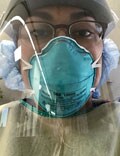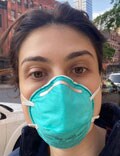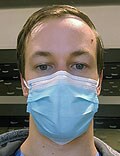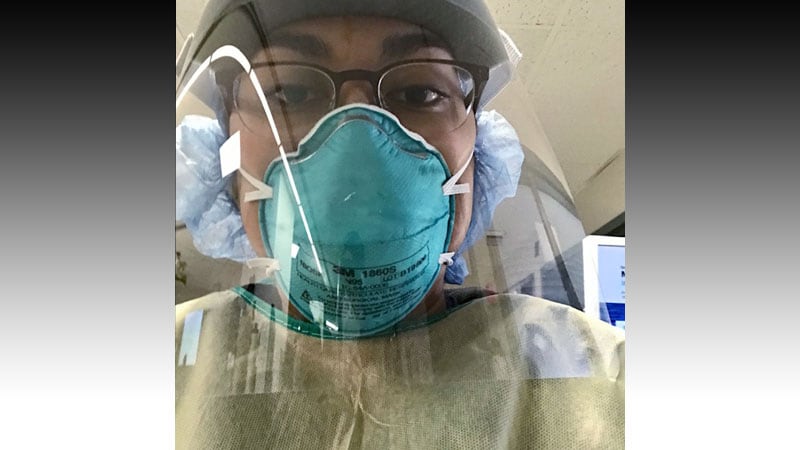Editor’s note: Find the latest COVID-19 news and guidance in Medscape’s Coronavirus Resource Center.
A series of tweets from a young psychiatry resident in the midst of the COVID-19 pandemic were stoic, straightforward, and heartbreaking.

Dr Sofia Noori
“I’m a 30-year-old doctor. I was supposed to get married next month. I’m volunteering to treat patients with COVID-19 on the frontline,” tweeted Sofia Noori, MD, a third-year psychiatry resident at Yale School of Medicine, New Haven, Connecticut.
“My medicine friends needed help and I’m not going to let them down,” she continued. “I canceled my wedding. I wrote my will instead.”
Noori was a few days into a 2-week rotation, helping out on the COVID-19 unit at her hospital. Ironically, she said, she was more anxious before being redeployed than when she actually got there.
“When we found out that we could volunteer to help, I felt it was my duty to do so. It helped me find meaning in this whole crazy pandemic that we’re going through and actually calmed me down,” Noori told Medscape Medical News.
“It was nice to know that all of us, no matter how much we subspecialize, still have this core knowledge to help people with,” she added.
Noori is just one of many young psychiatrists who have volunteered at the front lines of the COVID-19 pandemic. Doing so, they say, has given them a new understanding of medicine — and of themselves.

Dr Isobel Rosenthal
Isobel Rosenthal, MD, “was at the very beginning” of her career as a psychiatry intern when her general medicine rotation became COVID-19 medicine at Mount Sinai Hospital in New York City, where she went through a 6-week rotation.
If there’s another wave of cases in the future, Rosenthal said she would volunteer to go back.
“I hadn’t [predicted] my career going into being a primary care provider during a pandemic, but I felt supported and empowered by my team. Although the experience was difficult, I signed up to be a physician and if there’s a need for me to go back, I would,” she told Medscape Medical News.
The Next Wave of Frontline Providers
According to Joshua Gordon, MD, director of the National Institute of Mental Health, “psychiatry residents particularly, but also psychiatrists across the board, are playing all kinds of roles in the hospital” during this time, including helping out in the ICU, the ED’s, and elsewhere.
“Especially when hospitals don’t allow visitors and doctors are overwhelmed, keeping patients’ families informed about conditions and needed discussions is something psychiatrists are really skilled at,” Gordon told Medscape Medical News.
“We have important roles to play directly in the COVID pandemic but we’re also going to be the next wave of frontline providers, dealing with the indirect yet significant effects of mitigation and economics and social distancing. That’s where we’re going to be needed and it’s going to be more and more important as the weeks wear on,” he said.
Emily Pinto Taylor, MD, chief resident, Yale Primary Care and Internal Medicine, supervised Noori’s volunteer group’s COVID-floor rotation. The psych residents “transitioned pretty seamlessly” into their new roles, she said.
“They had already been doing internal medicine boot camp courses online,” and one even took a course from the Society of Critical Care Medicine on COVID-19 ICU basics for non-intensivists, she noted.
“During COVID, all of the patients essentially have the same underlying medical problems. It tends to be variations on a theme, depending on what their other comorbidities are and how we treat them, but management is somewhat routine,” Pinto Taylor said.
However, because many of their patients had comorbid psychiatric illnesses, the residents’ expertise on treating conditions such as uncontrolled schizophrenia or delirium and confusion in elderly patients proved quite useful, she said.
“Having psych residents helped us think through how we could best manage their mental status and how to reorient people,” she said.
“Facing My Mortality”
Noori wrote her will right before redeployment. “I had to face my mortality because I knew there were healthcare workers who had passed away” after being on the COVID-19 front lines, she said.
Now that she’s a few weeks past her rotation, Noori looks back at her time volunteering as positive and meaningful, albeit challenging.
She was a primary care doctor on the COVID-19 unit, which could hold up to 30 patients. Many times the number of patients was near maximum capacity, while other times it was half to two thirds full. She ordered oxygen and medications as needed and developed treatment plans. Her 2-week volunteer group included four psychiatry residents, along with an attending and a chief resident.
“The last time I had had a medical rotation was about 2 years ago,” said Noori, who is now a senior resident. “Having more supervision was really helpful since I was so rusty, but it all came back quickly.”
Noori said that during her redeployment, she was surprised how many members of the same families were affected by the disease. There were multiple couples where, for example, the wife would be on the COVID-19 floor and the husband at a different unit or even location.
“We had to figure out how best to support them. Also, sometimes the families didn’t want us to tell a spouse that the other one was also hospitalized or had died because they were worried it would hasten the [first spouse’s] death,” Noori recounted.
She also recalled a female patient who needed an increasing amount of oxygen, while her partner was sick in another hospital and her sibling had died from COVID-19 complications. “It was really sad to see how many families had been devastated,” she said.
Throughout all of it, Noori said, her psychiatric training was useful. “Because we speak day in and day out with people and families about their emotions, we’re better equipped to have certain discussions in some ways. We were ready from the get-go for those difficult conversations.”
Staying Grateful
During her redeployment rotation in New York City, Rosenthal wrote an essay about her experiences, which was picked up by Katie Couric’s Wake-Up Call site.
“In it I wrote about going into the situation being stressed and scared, and those weren’t necessarily feelings that went away. Like many of my colleagues, I was living by myself during the time that I was taking care of patients because I was worried about infecting my boyfriend,” she said.
She also started a gratitude journal, “because I needed that motivation to keep my head in the game and wanting to come back and do my job.”
Like Noori, Rosenthal was assigned to a general-medicine team that took care of patients positive for COVID-19. The team was capped at about 14 patients, whose care was shared between two residents and an attending physician.
For the healthcare providers and patients alike, she said, it was an experience like no other. PPE severely limited patient contact and the doctor/patient-relationship building she was used to. The clinicians found themselves engaged in atypical tasks such as holding up iPads so patients could livestream with their families.
Although it was a difficult time, Rosenthal said there were also some good moments. At one point, a group of first responders stood outside her hospital and clapped in appreciation as frontline workers walked out. “It was such as amazing experience,” she said.
“I think being part of a larger team within the hospital is something that will change my perspective on the rest of my training,” she said. “It’s important that we all stay up to date with other parts of medicine, not just our specialties,” Rosenthal said.
“Great Privilege”
Surinder Moonga, MD, and Christian Romanchek, MD, are psychiatry residents at Johns Hopkins in Baltimore, Maryland, who also volunteered to redeploy to the ICU unit at their own hospital.
Although there wasn’t a big surge in COVID-19 cases during their rotations, the hospital wanted to pull in healthcare providers from different specialties to prepare them for what the future may bring.
Moonga had gone through about 7 weeks on the ICU floor during his intern year and understood there was a need to help out during the pandemic.
Most of the patients he saw were intubated, so communication was difficult. However, he was able to help manage patients’ agitation and “what we called ‘ICU delirium,’ ” Moonga said.
But it was when he was talking with patients’ families that his psychiatry training really kicked in.

Dr Surinder Moonga
“Families were suffering tremendously because they couldn’t be with their loved ones,” he said. “I provided therapy over the phone and reoriented their perspective on this really horrible thing that was happening to them. It was an honor to do this and I think it’s only going to help make me a better doctor,” he said.
Romanchek had completed an entire year in internal medicine before coming to Johns Hopkins, so he felt this experience would be helpful on the COVID-19 front lines. “Still, it’s been an adjustment transitioning back to medicine in a high-stakes setting,” he said.

Dr Christian Romanchek
He noted that other members of his team were incredibly supportive, and he had a lot of supervision. In addition, his institution provided educational materials about the coronavirus, as well as refresher information and videos on basic ICU and general critical care.
For other psychiatrists interested in doing what he did, Romancheck had some advice.
“I would say everything you can learn about acute respiratory distress syndrome would be helpful because that’s what we’re doing on the day-to-day,” Romanchek said. He added that reading about ongoing research into COVID-19 treatments is also essential.
Overall, “it’s been a really interesting experience for me and a really rewarding one,” he said.
Brave, Resilient
Noori said the pandemic helped her realize that “all of us are braver and more resilient” than they thought. “Also, this experience reminded me that I am a medical doctor and, when push comes to shove, I can care for people even if it’s not in my specialty.”
Although she would volunteer again if needed, Noori said it was a very personal decision. “At least for me, it’s actually really healing to know you did what you could do to help others during a time when it feels like everything is out of your control.”
Volunteering wasn’t without its challenges. She had a ritual she’d follow when she came home from the hospital each night, in which she would immediately put her clothes into a trash bag, shower, put the clothes into the laundry, and “not let anyone touch anything.”
“It took me 30 to 40 minutes every night to basically disinfect myself before I could pet my dog or kiss my fiancé,” she said.
Walking through the room during the interview, Noori’s fiancé said he knew volunteering was something she needed to do, “so I was all for it.” But when asked if he had been scared for her during that time, he quietly said, “Yeah, I was.”
Follow Deborah Brauser on Twitter: @MedscapeDeb
For more Medscape Psychiatry news, join us on Facebook and Twitter
